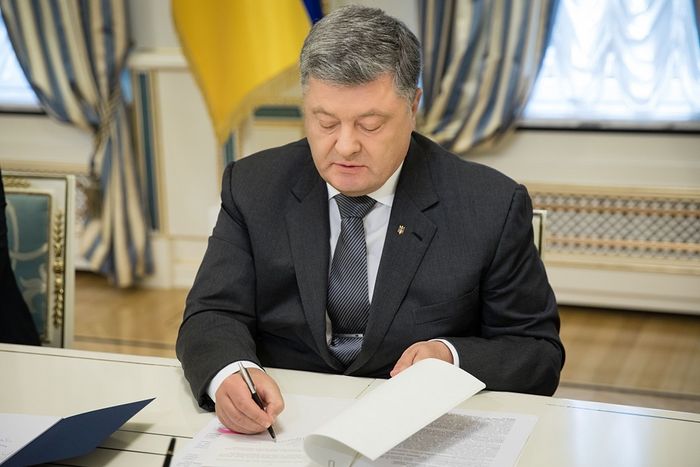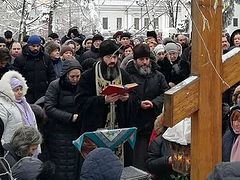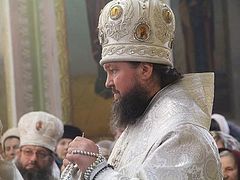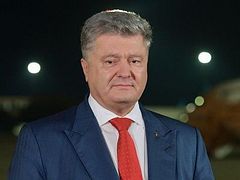Kiev, December 24, 2018
Ukrainian President Petro Poroshenko signed the anti-Church bill No. 5309 into law on Saturday, December 22, reports the official site of the President of Ukraine.
Bill no. 5309, “On Amendments to the Law of Ukraine ‘On Freedom of Conscience and Religious Organizations’ as Regards the Names of Religious Organizations (Associations) Which are a Part of the Structure of a Religious Organization (Association), Whose Administrative Center is outside Ukraine—in the State Which, as Recognized by the Law, Committed Military Aggression against Ukraine and/or Temporarily Occupied a Part of the Territory of Ukraine,” was passed by the Verkhovna Rada, the Ukrainian Parliament, on December 20.
Though the bill mentions no churches by name, only the canonical Ukrainian Orthodox Church falls under its conditions. The new law will force the Church to rename itself the “Russian Orthodox Church in Ukraine,” with Russia being legally considered an aggressor state by Ukraine. The passing of bill No. 5309 is widely considered merely a pretext for lawfully protecting the seizure of property from the canonical Ukrainian Church.
A brawl broke out in the Parliamentary hall after the vote on the bill between those opposed to and those for it.
The bill has been floating around for two years already but was passed only now that Constantinople created a new nationalist church in Ukraine. The bill was placed back on the agenda at the request of Philaret Denisenko, the leading schismatic in Ukraine, according to Rada Speaker Andrei Paruby.
According to the Ukrainian head of state, the new law adheres “to the principle of freedom of religion and equality of all denominations; there will be no restriction of the constitutional rights of citizens.”
Poroshenko has repeatedly promised to protect the rights of those who choose to remain with the canonical Ukrainian and to prevent the violent seizure of churches, though this promise has not been kept in any way.
Reports from Saturday say that yet another church of the canonical Church was seized by radicals. It occurred in the Vinnitsa Diocese where the former ruling hierarch departed into schism, forcefully taking the Holy Transfiguration Cathedral with him.
“People have the constitutional right to free choice of religion. The above-mentioned changes to the law create better conditions for the exercise of such a right for those who decide which Orthodox jurisdiction to belong to ... Either to the newly created autocephalous Orthodox Church of Ukraine, or to the Church that insists on maintaining its connection and dependence on the ROC,” Poroshenko stressed, signing the law.
The President emphasized: “It is easier to make a choice when all things are called by their names, when there is enough information to make this choice voluntary. The implementation of the law will give the citizens full information.”
Archpriest Alexander Bakhov, the head of the Ukrainian Church’s legal department, has said that only the hierarchs can change the Church’s name, and that any forced name change will be challenged in court.
Moreover, the Ukrainian Church has repeatedly emphasized that the Church’s legal and administrative center is in Kiev, not Moscow, though most Ukrainian politicians choose not to listen.
Archpriest Nikolai Danilevich, the Deputy Head of the Ukrainian Church’s Department for External Church Relations explains the state’s error:
The legal center of the UOC is in Kiev. Canonical connections, the commemoration of the President—these are canonical things are nothing for the state. How we baptize or don’t baptize, who we have a prayerful connection with, and who not—this does not concern the state. We don’t live in Byzantine Empire times, where the Church canons had the force of state law… What the Verkhovna Rada is doing is a mixture of Church and canonical questions with legal questions.
The newly-signed law goes hand-in-hand with two other bills being considered by the Verkhovna Rada. Bills Nos. 4128 and 4511 are also aimed against the canonical Ukrainian Church. Bill No. 4128, “Amendments to the Ukrainian law on the freedom of conscience and religious organizations (for the changing of jurisdiction by religious communities),” would make it easier for churches to be seized by schismatics, while bill No. 4511, “On the special status of religious organizations with headquarters located in states recognized by the Verkhovna Rada of Ukraine as aggressor states,” proposes that such religious organizations be able to appoint metropolitans and bishops only in agreement with the governing authorities. The same bill also gives the government the right to forbid a confession if its representatives cooperate with religious centers in “aggressor states.”
Follow us on Facebook!




